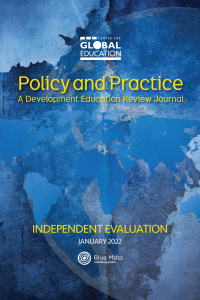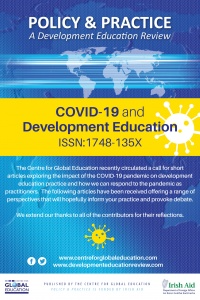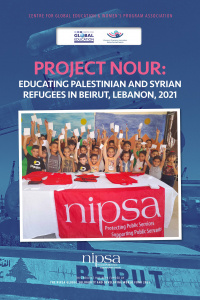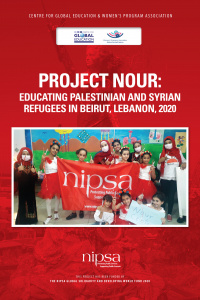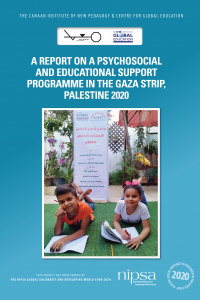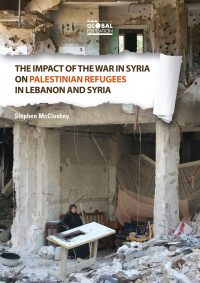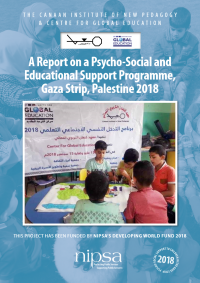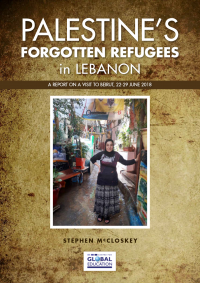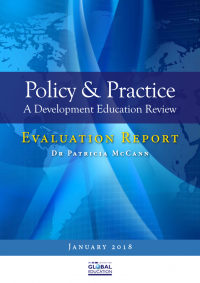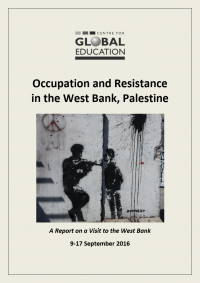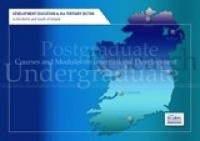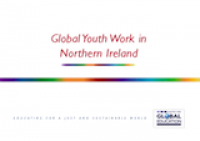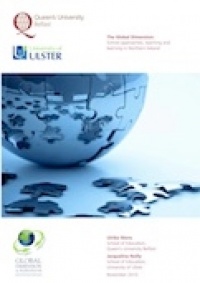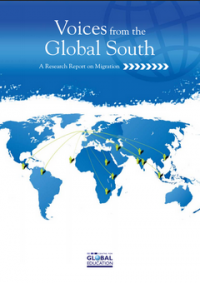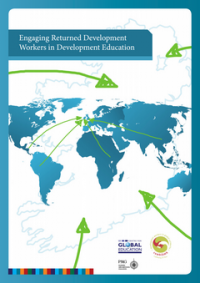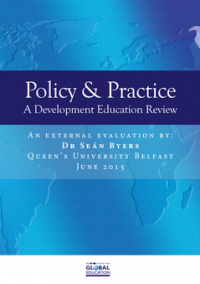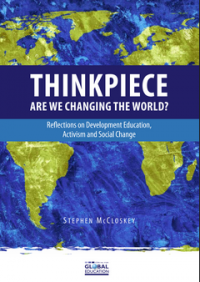One of the strategic aims of the Centre for Global Education is to research our practice in order ‘to influence debate on the practice of development education by documenting and disseminating learning we acquire through our work’. The Centre also aims to ‘illuminate the links between Ireland and the global South’.
In fulfilling these aims the Centre carries out research in three specific areas. Firstly, we monitor and evaluate our development education activities both internally and externally to assess the impact of our work on learners. This form of research is carried out internally by the Centre’s staff and externally by independent consultants. Secondly, we commission research on development education practice in specific sectors. Two recent reports in this area include ‘Engaging Returned Development Workers in Development Education’ and ‘Promoting Development Education in Youth Work Training’. These reports aim to strengthen practice in these sectors by identifying the needs of learners and educators. Thirdly, the Centre commissions research on development issues which have a local and global resonance. Recent reports of this nature include ‘Voices from the Global South: A report on Migration’ which examined the experiences of migrants from the global South who have recently settled in Ireland. These reports are available in this section as pdfs.
Research
In April 2024, the Centre for Global Education contributed an opinion piece under the title: Conflict, Climate and Migration in the Context of Gaza to the Development Studies Association of Ireland which considered the human toll of Israel’s war on Gaza’s civilian population since October 2023. It also considered the carbon footprint of Israel’s war drawing upon ‘A Multi-temporal Snapshot of Greenhouse Gas Emissions from the Israel-Gaza Conflict’ carried out by academics from Lancaster University and Queen Mary University of London. It found that carbon emissions resulting from ‘aircraft missions, tanks and fuel from other vehicles’ including US cargo planes ‘was equivalent to burning at least 150,000 tonnes of coal’.
This research report explores conceptualisations and constructs of global citizenship. “Going Global?” captures the findings of a year-long engaged research project that was led by Dr Barry Cannon of Maynooth University, in partnership with the Centre for Global Education, Comhlámh and Suas. The research included two participative workshops in Belfast and Dublin organised by CGE, Comhlamh and Suas to support an all-island exploration of the meaning and content of global citizenship.
This report assesses the impact of Lebanon’s four-year economic crisis on the social and economic conditions experienced by Palestinians. The report is based on field visits carried out in May, September and November 2022 to nine Palestinian refugee camps in Lebanon. The report focuses specifically on the health, education and the socio-economic status of Palestinians in Lebanon since the precipitous collapse of Lebanon’s economy in 2019. The marginalisation of Palestinians in Lebanese society has left them particularly vulnerable to the sharp economic contraction of recent years. Published May 2023.
This report assesses the impact of Lebanon’s current economic crisis on the socio-economic status of 180,000 Palestinian refugees living in the country. Since 2019, Lebanon’s economy has been locked in a prolonged crisis triggered by a debt default that has seen the currency lose 98 per cent of its value and inflation rocket to 200 per cent. This has caused a surge in the prices of daily necessities such as food, domestic fuel and transportation. Palestinians have been on the frontline of this economic crisis. Displaced from their homeland since 1948, Palestinian refugees in Lebanon have never been naturalized, are excluded from 39 syndicated occupations and denied property rights. Their marginal status has been exacerbated by the arrival of 29,000 Palestinian Refugees from Syria (PRS) who have fled the civil war in Syria. This has created a race to the bottom in terms of competition for low paying jobs in the informal sector. Palestinians have also been severely impacted by the COVID-19 pandemic, and their health, education and living conditions are deteriorating as a consequence of Lebanon’s economic meltdown. The report is based on three field visits to nine Palestinian camps in Lebanon in 2022 and the latest research by UN agencies working in the country.
This report presents the findings of research into the extent to which the international development and development education sectors are engaging with the current dominant economic system, i.e. neoliberalism/’free market’ economics, and its influence on poverty, inequality and injustice as part of their education work with the public.
This report sets out the findings on an independent evaluation of the Centre for Global Education’s journal, Policy and Practice: A Development Education Review carried out by Blue Moss. The report assesses the extent to which the journal is building development education capacity locally and globally and strengthening the policy environment for development education practice.
The Centre for Global Education’s bi-annual journal, Policy and Practice: A Development Education Review, has published a special collection of short articles exploring the impact of the COVID-19 pandemic on development education practice and how we can respond to the pandemic as practitioners. The following twelve articles offer a range of perspectives that will hopefully inform practice and provoke debate.
This is a report on an educational project delivered to 100 Palestinian and Syrian refugee children, aged 6-13 years, who are unable to attend school and suffering from the acute effects of trauma caused by exposure to severe poverty in Burj Barajneh refugee camp Beirut, Lebanon. The project provided formal education in a community setting, to enhance the young people’s understanding of key areas of the schools’ curriculum including literacy and numeracy. The project also provided psychosocial care to help address mental health problems among the child participants caused by the severe social and economic problems in the refugee camp. This was the second year of a two-year project (2020-2021) jointly managed by the Centre for Global Education (CGE) and the Women’s Program Association, a Palestinian NGO based in Lebanon. The project was funded by NIPSA.
This is a report on an educational project delivered to 75 Palestinian and Syrian refugee children, aged 7-12 years, suffering from the acute effects of trauma caused by exposure to severe poverty in therefugee camp of Burj Barajneh in Beirut, Lebanon. The project provided formal education in a community setting, to enhance the young people’s understanding of key areas of the schools’ curriculum including literacy and numeracy. The project also provided psychosocial care to help address mental health problems among the child participants caused by the severe social and economic problems in the refugee camp. This was the first year of a two-year project (2020-2021) jointly managed by the Centre for Global Education (CGE) and the Women’s Program Association, a Palestinian NGO based in Lebanon.
This report describes the activities of an education and psychosocial support programme in the Gaza Strip, Palestine in 2020 funded by the trade union NIPSA. The project provided community-based learning opportunities for 400 children, aged 7-12 experiencing mental health problems caused by severe poverty and the constant exposure to conflict. The project activities enhanced the children’s knowledge and understanding of key areas of the schools’ curriculum such as literacy and numeracy, and used interactive development education methodologies to provide psychosocial care.
This report examines the impact of the near decade long war in Syria on Palestinian refugees. Since 2011, 60 per cent of Palestinian Refugees Syria (PRS) have been displaced at least once, more than 4,000 have been killed and three Palestinian camps in Syria have been destroyed. In the same period, 77,329 Palestinian refugees have been born into highly vulnerable and impoverished communities with the UN reporting 95 per cent of PRS in need of ‘sustained humanitarian assistance’. 29,000 PRS have fled to neighbouring Lebanon where Palestinian Refugees Lebanon (PRL) endure a permanent ‘foreigner’ status without citizenship, property rights and access to nearly 40 occupations. The report considers the impact of the ongoing Syrian war on PRS and PRL in the context of the current economic upheaval in Lebanon, cuts to the budget of the UN agency for Palestinian refugees and the COVID-19 pandemic.
This research report is based on a visit to Lebanon in June 2018 to assess the living conditions of Palestinian refugees and the impact of their marginalised status within Lebanon. The report is based upon a visit to three refugee camps in Beirut.
This research report examines the impact and reception of the Centre's flagship project "Policy & Practice: A Development Education Review". It is based on a survey and other research conducted by Dr Patricia McCann.
This research report is based on a visit to the West Bank in September 2016
Development Education in the Tertiary Sector is a reference guide containing information on courses and modules on development education and development issues. This document is the most complete guide to development studies in the island of Ireland although we recognise that the tertiary sector is constantly changing in terms of new courses coming on stream, existing courses changing their content / structure, and new appointments in academia. However, at the very least, the document provides a baseline from which we can conduct further studies in the future and offers some guidance as to the expanding number of opportunities available to study development issues at tertiary level. The Centre hopes that the document will promote discussion on development education in the tertiary sector and encourage further research initiatives at third level.
In April 2008, the Centre in partnership with the Community Youth Work Team at the Ulster University (Jordanstown), commissioned a practice-based research project with the aim of enhancing development education practice in youth work training.
The research was carried out on our behalf by independent consultants Dare to Stretch and involved qualitative research into the global dimension in the BSc Honours in Community Youth Work at Jordanstown. The research aimed to determine trainee youth workers’ knowledge of, and interest in, global youth work. The research process included the delivery of exemplar seminars on global youth work to demonstrate the effectiveness of development education methodologies in the delivery of youth work training. The research found that an overwhelming majority of research participants believed that ‘a global dimension should be incorporated into professional youth work training at the University of Ulster’. They considered a global dimension to be relevant to both youth work theory and practice so that youth workers can enable ‘young people to critique the wider world’
This research was supported over a two year period by the Department for International Development to monitor and assess how the revised Northern Ireland curriculum is facilitating delivery and enhancing awareness of global education in schools. The research employed qualitative and quantitative research methods and focused on teachers, student teachers and pupils. The research objectives were to:
- Identify organizational strategies employed by schools and teaching strategies and resources perceived as beneficial for learning about global issues;
- Explore teachers’, student teachers’ and pupils’ understandings of the global dimension and their attitudes to related issues.
- Investigate the extent to which pupils learn about issues related to the global dimension in schools and to compare this to their attitudes and reported activist behaviours.
In April 2009, the Centre received funding from the Department for International Development (DFID) to commission and manage a research-based project that aimed to investigate and analyse our increasingly diverse society through a series of case studies. The case studies presented biographical profiles of individuals that reflect the increasing diversity of our society arising from inward migration. The case studies focused on three specific groups: first generation migrants; second generation migrants; and refugees. The first generation migrants were sub-divided between economic migrants and students and / or family members. Refugees included asylum-seekers who have made claims for refugee status.
The research identified some of the challenges confronted by individuals who have come to live in the north of Ireland from other societies in Europe and the global South such as racism, accessing public services and adjusting to local cultures and lifestyles. While individual case studies can not reflect the life experiences of an entire community or ethnic group living in the north of Ireland they can collectively provide us with an informative and insightful perspective on life for migrants in our society.
In 2011, the Centre published a new research study titled ‘Engaging Returned Development Workers in Development Education’. The aim of the study was ‘to commission a mapping and consultation exercise designed to engage Returned Development Workers (RDWs) in global education’. The project was delivered in partnership with Comhlámh, the association of returned development workers, and involved the following: first, the compilation of a comprehensive database of RDWs in Northern Ireland; second, consultation with this constituency through qualitative and quantitative research methods.
Consultation with the sector included interviews, focus groups and questionnaire surveys to identify the needs of RDWs in respect to issues like post-placement employment and personal development, networking with other RDWs, getting involved in global education and sharing skills, knowledge and expertise.
The Centre for Global Education would like to thank Dr Seán Byers, Queen’s University Belfast, for carrying out this review of our bi-annual journal Policy and Practice: A Development Education Review. Dr Byers brought rigour, professionalism and clarity to his review which provides a most useful assessment of the journal’s standing in the development education sector in the island of Ireland and in a wider, global context.
Policy and Practice is a peer reviewed, bi-annual, open access journal published by the Centre for Global Education, a development organisation based in Belfast. First published in 2005, Policy and Practice aims to provide a space for global education practitioners to critically reflect on their practice and debate new policy developments. The journal aims to share research findings, update academics and practitioners on policy developments, celebrate and promote existing good practice in global education, inform the work of practitioners in development education and related adjectival education organisations and to promote global education within the statutory education sector in Ireland.
This article has been published as part of a one year development education project delivered by the Centre for Global Education and funded by Trócaire. It aims to support reflection and debate on how development educators engage the public on international development issues. The article comes on the back of recent research, most notably Oxfam’s Finding Frames report, which suggests that the development sector is struggling to enhance and sustain citizenship engagement on the structural causes of poverty and inequality. The article probes some of the factors that may underpin this lack of engagement both within the development education sector specifically and the wider development
sector more generally. It examines some of the challenges involved in engaging learners in actions on global issues. Some of these challenges relate to the sectors and environmental pressures in which development educators operate which can thwart in-depth engagement with learners.











